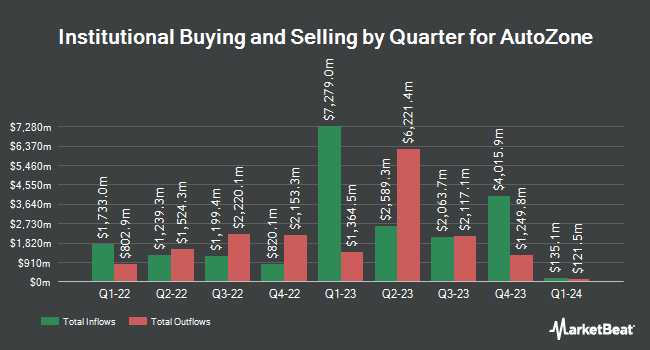Jefferies Financial Group Inc. lowered its stake in shares of AutoZone, Inc. (NYSE:AZO - Free Report) by 52.8% during the fourth quarter, according to its most recent Form 13F filing with the Securities and Exchange Commission (SEC). The institutional investor owned 473 shares of the company's stock after selling 529 shares during the quarter. Jefferies Financial Group Inc.'s holdings in AutoZone were worth $1,515,000 at the end of the most recent reporting period.
A number of other large investors have also added to or reduced their stakes in the stock. Proficio Capital Partners LLC grew its holdings in shares of AutoZone by 482,040.2% during the 4th quarter. Proficio Capital Partners LLC now owns 419,462 shares of the company's stock worth $1,343,117,000 after purchasing an additional 419,375 shares in the last quarter. Norges Bank acquired a new stake in shares of AutoZone during the 4th quarter worth $834,556,000. Strategic Financial Concepts LLC acquired a new stake in shares of AutoZone during the 4th quarter worth $471,629,000. Wealthfront Advisers LLC grew its stake in AutoZone by 6,083.9% during the fourth quarter. Wealthfront Advisers LLC now owns 90,656 shares of the company's stock worth $290,281,000 after buying an additional 89,190 shares in the last quarter. Finally, Barclays PLC grew its stake in AutoZone by 82.6% during the fourth quarter. Barclays PLC now owns 170,216 shares of the company's stock worth $545,033,000 after buying an additional 77,015 shares in the last quarter. Institutional investors and hedge funds own 92.74% of the company's stock.
Analyst Ratings Changes
A number of equities research analysts have issued reports on the stock. Evercore ISI set a $3,950.00 price objective on shares of AutoZone in a research note on Monday, May 19th. Morgan Stanley reiterated an "overweight" rating and set a $4,000.00 price target (up previously from $3,750.00) on shares of AutoZone in a research report on Wednesday. Mizuho raised their target price on AutoZone from $3,600.00 to $3,740.00 and gave the company an "outperform" rating in a report on Wednesday, March 5th. Roth Capital set a $3,763.00 target price on AutoZone in a report on Wednesday, March 5th. Finally, Bank of America raised AutoZone from a "neutral" rating to a "buy" rating and raised their target price for the company from $3,900.00 to $4,800.00 in a report on Wednesday, May 21st. Two investment analysts have rated the stock with a hold rating, eighteen have given a buy rating and four have given a strong buy rating to the company's stock. According to data from MarketBeat.com, AutoZone currently has a consensus rating of "Buy" and an average target price of $4,054.52.
Read Our Latest Stock Analysis on AZO
Insider Transactions at AutoZone
In other AutoZone news, SVP Bailey L. Childress sold 160 shares of AutoZone stock in a transaction dated Wednesday, March 5th. The stock was sold at an average price of $3,550.00, for a total transaction of $568,000.00. Following the transaction, the senior vice president now directly owns 50 shares of the company's stock, valued at approximately $177,500. The trade was a 76.19% decrease in their position. The sale was disclosed in a filing with the Securities & Exchange Commission, which can be accessed through this link. Also, VP Domingo Hurtado sold 4,800 shares of AutoZone stock in a transaction that occurred on Tuesday, April 22nd. The stock was sold at an average price of $3,660.00, for a total value of $17,568,000.00. Following the completion of the transaction, the vice president now directly owns 159 shares in the company, valued at approximately $581,940. This represents a 96.79% decrease in their ownership of the stock. The disclosure for this sale can be found here. Over the last 90 days, insiders have sold 11,521 shares of company stock worth $42,177,331. Company insiders own 2.10% of the company's stock.
AutoZone Stock Up 1.3%
Shares of AZO stock traded up $46.58 during mid-day trading on Friday, reaching $3,736.21. 190,971 shares of the stock traded hands, compared to its average volume of 129,819. The stock's fifty day simple moving average is $3,698.83 and its two-hundred day simple moving average is $3,468.68. AutoZone, Inc. has a 1-year low of $2,728.97 and a 1-year high of $3,916.81. The company has a market cap of $62.70 billion, a price-to-earnings ratio of 24.96, a price-to-earnings-growth ratio of 1.86 and a beta of 0.44.
AutoZone (NYSE:AZO - Get Free Report) last posted its earnings results on Tuesday, May 27th. The company reported $35.36 EPS for the quarter, missing the consensus estimate of $37.07 by ($1.71). AutoZone had a negative return on equity of 53.89% and a net margin of 14.18%. The business had revenue of $4.46 billion for the quarter, compared to analyst estimates of $4.41 billion. During the same quarter in the prior year, the business earned $36.69 earnings per share. The firm's quarterly revenue was up 5.4% on a year-over-year basis. On average, equities research analysts anticipate that AutoZone, Inc. will post 152.94 EPS for the current fiscal year.
AutoZone Company Profile
(
Free Report)
AutoZone, Inc retails and distributes automotive replacement parts and accessories in the United States, Mexico, and Brazil. The company provides various products for cars, sport utility vehicles, vans, and light trucks, including new and remanufactured automotive hard parts, maintenance items, accessories, and non-automotive products.
See Also

Before you consider AutoZone, you'll want to hear this.
MarketBeat keeps track of Wall Street's top-rated and best performing research analysts and the stocks they recommend to their clients on a daily basis. MarketBeat has identified the five stocks that top analysts are quietly whispering to their clients to buy now before the broader market catches on... and AutoZone wasn't on the list.
While AutoZone currently has a Buy rating among analysts, top-rated analysts believe these five stocks are better buys.
View The Five Stocks Here
Discover the 10 Best High-Yield Dividend Stocks for 2025 and secure reliable income in uncertain markets. Download the report now to identify top dividend payers and avoid common yield traps.
Get This Free Report